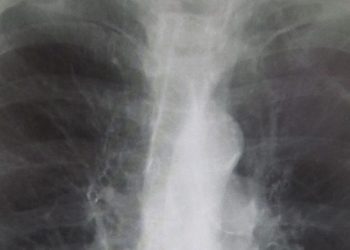Mepolizumab reduces exacerbations in severe eosinophilic asthma [MENSA trial]
1. The rate of asthma exacerbations was significantly reduced in patients with severe eosphinophilic asthma receiving either intravenous or subcutaneous mepolizumab, compared to patients receiving placebo.
2. The safety profile of mepolizumab was similar to placebo.
Evidence Rating Level: 1 (Excellent)
Study Rundown: Previous research has defined a subgroup of asthma patients with what is referred to as eosinophilic airway inflammation; these patients experience high rates of recurrent asthma exacerbations involving emergency department (ED) visits, hospitalizations, and prolonged steroid use. In the Mepolizumab as Adjunctive Therapy in Patients with Severe Asthma (MENSA) trial, the authors investigated the use of mepolizumab, a selective antibody targeted at the signalling chemical, interleukin-5, in a cohort of 576 patients with evidence of eosinophilic inflammation.
The rate of asthma exacerbations was significantly reduced in those patients receiving either intravenous (IV) or subcutaneous (SC) mepolizumab compared to patients receiving placebo. The treatment groups also showed significant improvement in the forced expiratory volume in 1 second (FEV1) – a measure used to assess disease severity – and on questionnaires regarding respiratory function compared to the placebo group. The safety profile of mepolizumab was similar to placebo.
The strengths of this study include the randomized, double-blind, double-dummy design and the use of mepolizumab in a well-defined cohort of patients with the eosinophilic inflammation subtype of severe asthma. Of note, there was a substantial reduction in the number of asthma exacerbations in the placebo group when compared to baseline, suggesting that optimal use of existing treatments may also be an effective way to manage severe asthma. The follow-up period was 32 weeks, limiting these findings to a short-term analysis; furthermore, the study was funded by the drug company, GlaxoSmithKline.
Click to read the study in NEJM
Click to read an accompanying editorial in NEJM
Relevant Reading: Mepolizumab and exacerbations of refractory eosinophilic asthma
In-Depth [randomized controlled trial]: The MENSA study was a multicenter, randomized, double-blind, placebo-controlled trial investigating the use of mepolizumab, a humanized monoclonal antibody directed against IL-5, in patients with severe asthma and evidence of eosinophilia. The study involved 576 patients with recurrent asthma exacerbations, ages 12 to 82, and with high levels of eosinophil counts. They were randomized to receive either IV or SC mepolizumab, or a placebo as a sham injection. The primary outcome was the annualized frequency of clinically significant asthma exacerbations (defined as incidences where the treating physician elected to use systemic steroids for at least 3 days, ED visit was necessary, or asthma-related hospitalization).
Compared with placebo, the relative reduction in the primary outcome was 47% (95% CI, 29 to 61) in the IV mepolizumab group and 53% (95% CI, 37 to 65) in the SC group (P<0.001 for both comparisons). On Kaplan-Meier curves, these differences in exacerbation rate were evident throughout the follow-up period of 32 weeks. In the secondary outcomes analysis, there was a significant improvement in FEV1 over 32 weeks in both treatment formulation groups, as well as significant improvements in scores on a quality of life survey administered in the study. The overall incidence of adverse events was similar in the 3 groups (84% in the IV mepolizumab group, 78% in the SC mepolizumab group, and 83% in the placebo group).
More from this author: Gene mutation associated with antimalarial resistance across Southeast Asia, Moderate sodium intake optimal for cardiovascular health, Transfusion therapy linked with reduced neurovascular disease in sickle cell anemia, Severe subtype of acute lymphoblastic leukemia susceptible to FDA-approved kinase inhibitors, TASTE trial: Thrombus aspiration before PCI in STEMI does not reduce mortality
Image: PD
©2012-2014 2minutemedicine.com. All rights reserved. No works may be reproduced without expressed written consent from 2minutemedicine.com. Disclaimer: We present factual information directly from peer reviewed medical journals. No post should be construed as medical advice and is not intended as such by the authors, editors, staff or by 2minutemedicine.com. PLEASE SEE A HEALTHCARE PROVIDER IN YOUR AREA IF YOU SEEK MEDICAL ADVICE OF ANY SORT.



![Macitentan better than placebo for preventing progression of pulmonary arterial hypertension [SERAPHIN Trial]](https://www.2minutemedicine.com/wp-content/uploads/2013/08/ca68dc0329bef0b42ccae7b6656a0f_gallery-350x250.jpg)



